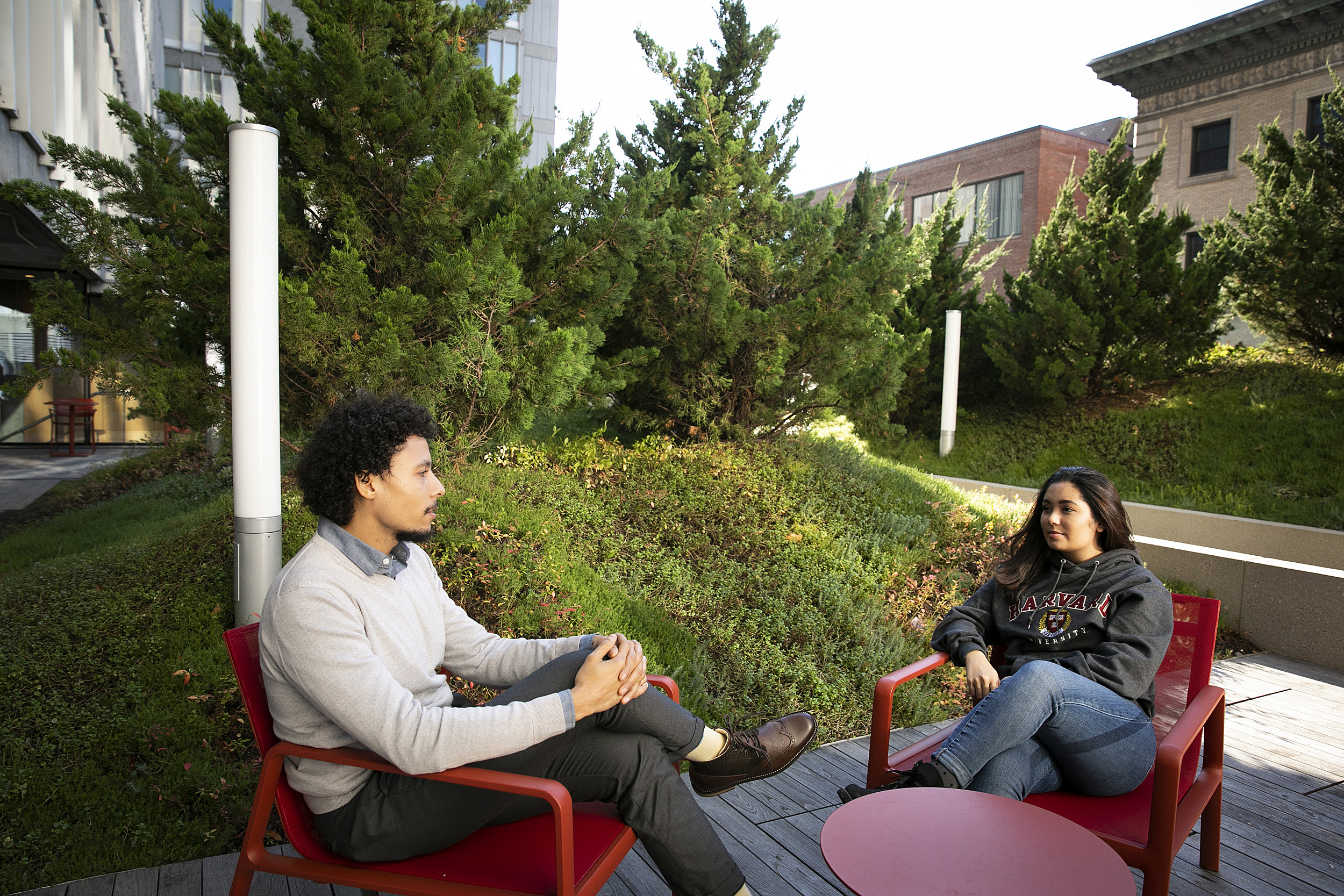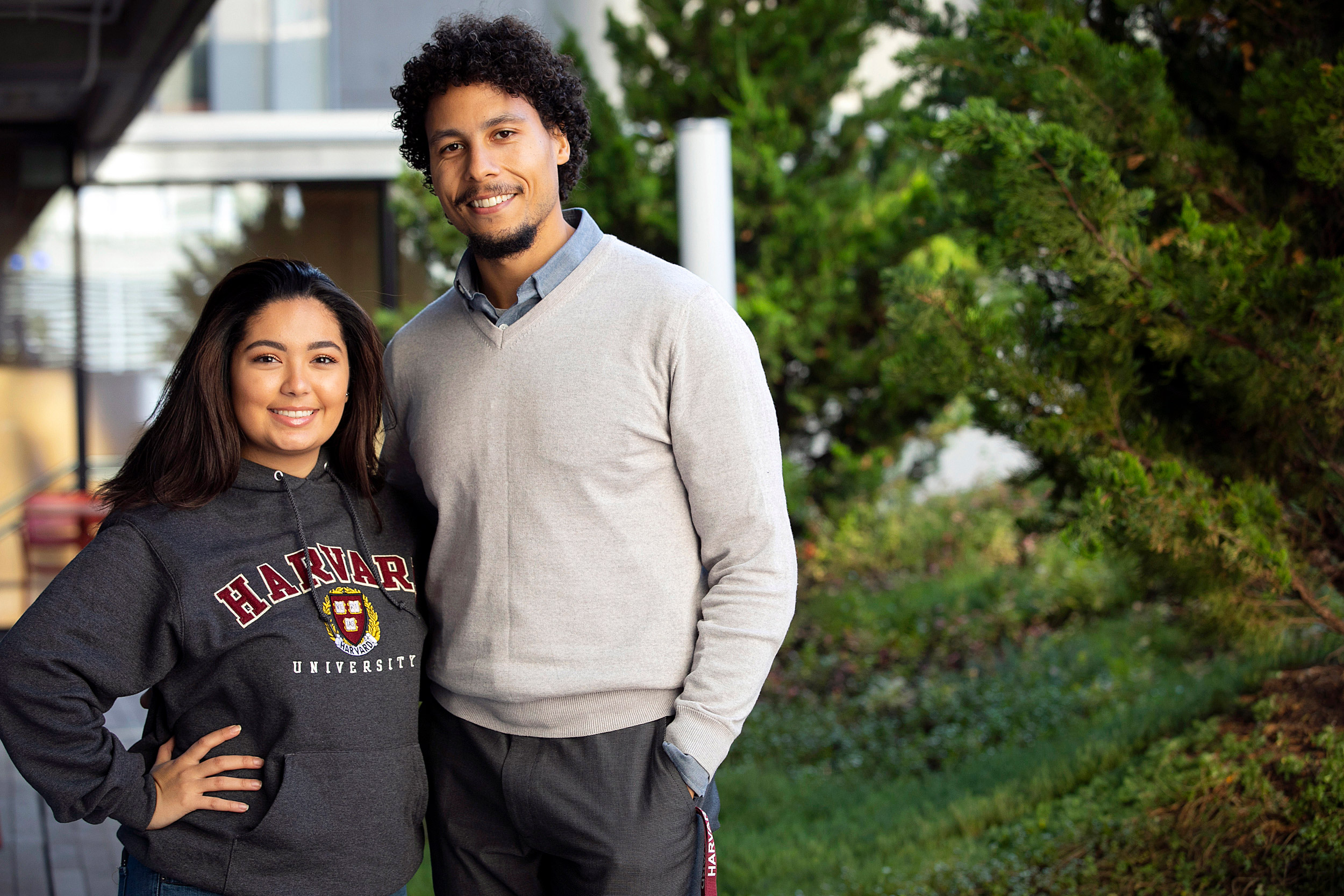
Dan Lobo ’14, president of the First Generation Harvard Alumni shared-interest group, speaks with Alejandra Iglesias ’21, the current president of Primus, about the power of stories.
Photos by Stephanie Mitchell/Harvard Staff Photographer
Authors of their own stories
New first-generation Red Book helps bind a community
It was a day of firsts. Harvard alumni, students, and faculty gathered last Friday to mark the University’s inaugural observance of the National First-Generation College Celebration, which highlights this community’s contributions on campus. It also marked the unveiling of the First Generation Harvard Alumni Red Book, published by the Harvard Alumni Association. The publication gives first-gen graduates a way to keep up with each other in the same way the traditional Red Books have allowed the wider College and Radcliffe alumni community to share their life updates since the mid-1800s.
“Stories change minds, change lives, even change history,” said Dan Lobo ’14, who was instrumental in the project. As a student, Lobo founded the Harvard College First Generation Student Union (FGSU) — now known as Harvard Primus — in 2013. Lobo, who is currently an undergraduate adviser in the Office of Career Services, is president of the First Generation Harvard Alumni shared-interest group. He and Alejandra Iglesias ’21, president of Primus, spoke with the Gazette to reflect on their own experiences and the power of stories.
Q&A
Dan Lobo and Alejandra Iglesias
GAZETTE: With the launch of the first-gen Red Book, does the idea that stories matter take on new meaning for you?
lobo: It can be easy to trivialize the impact of stories, but my experience has been that stories change lives. The story of the American dream is what brought my mom from a small island off the coast of Africa to the United States. The story of successful people going to Harvard is what got me to Harvard. I’ve found that stories are a motivating factor in my life and in our community.
Iglesias: I think what’s important about the Red Book is that students sometimes don’t feel comfortable opening up to each other, but you read these stories and feel validated. I think hearing people’s voices, hearing their stories, empowers us to come forward and open up about our own.
GAZETTE: Tell me about the origins of the first-generation Red Book.
lobo: We had been thinking for a number of years about how we could get to know each other better and share our stories with one another in our alumni shared-interest group. This serves as a community-building tool within our organization, but it also connects us back to students. It’s like you’re saying, “Welcome to the community. We can’t wait to connect with you.” The Red Book provides a tangible way to begin to make those connections.
GAZETTE: What do you know now that you wish you had known as a first-year student?
Iglesias: One of the things I’m learning is to know when to ask for help. When you come here, you’ve done everything on your own for so long. Then you get here, and you don’t know anybody, but you get a peer advising fellow and a proctor and an academic adviser — all these different people who are there for you. And yet part of the first-gen experience is that you don’t know how to actually go to them and say, “I’m struggling. Can you help me?” And I made the mistake of not asking for help and nearly failing one of my classes.
lobo: Same here. I wish I knew that life’s journey doesn’t need to be so stressful. I wish I knew that exploration is supposed to be fun. Being hard on yourself is so counterproductive. I can see that clearly now. I would’ve known that it’s going to be fine, but it’s hard to trust yourself in that way.
GAZETTE: Dan, how has being part of the First Generation Harvard Alumni shared-interest group helped you to navigate the experience of being first-gen?
lobo: The issues that come with being first-gen never end. The narrative goes that you get the College degree, you’re on a path of upward social mobility, and everything’s going to be all good. But my experience as an alumnus is that I can’t get advice on career decisions from my parents, so seeking out mentors is extremely important. It’s all completely new territory. You need advice from people who have gone through a similar experience, and that’s what the First-Generation shared-interest group community has been for me.

GAZETTE: How does Primus connect and support students? How are alumni involved?
Iglesias: Primus does a lot of community building, working closely with the administration to advocate for issues that have to do with being first-gen on campus, planning social events, having professional-development opportunities, and just giving students a place to come together. One of the biggest ways alumni are involved is through the mentoring program, which pairs first-year students with alumni in the area to help guide students through that first year. My mentor, Mercedes Soto ’90, has been there for me through so much. My first summer here, my housing fell through and I didn’t know where to go. Without me even having to ask she offered me a room in her place. That was surreal to me. As a first-gen it’s hard and takes a lot of courage to go up and ask for something, and for someone to just open their arms meant a lot to me. She’s someone I can fall back on and really rely on for anything.
GAZETTE: How has life for first-generation students at Harvard changed from when Primus was started in 2013?
Iglesias: Something that we are really proud of is the First Year Retreat Experience (FYRE) program for incoming first-year students, which was the result of advocacy efforts dating back to the founding of FGSU in 2013. It’s taken years of work by a lot of student leaders on top of a job and on top of schoolwork, and we are finally seeing the results of that. The work isn’t over yet, and we have to keep going, but the fact that FYRE was institutionalized by Harvard just proves that our voices coming together and fighting for something that matters really does have an impact.
[FYRE launched in 2018 as a two-year pilot program supported by the Dean of Student’s Office and will continue next year.]
GAZETTE: In the Red Book, you’re telling your own stories in your own words. Why is that significant?
lobo: To me, telling our stories this way is a way to feel fully included in the Harvard community. When I first came to Harvard, I quickly learned to hide my story. I didn’t feel comfortable telling my story. It wasn’t something that made me feel included; it was something that made me feel excluded. A big part of my Harvard identity has been learning to bring my full self to this community, and the Red Book is a tangible marker of that.
GAZETTE: How have the first-gen community and other communities that you’re a part of helped you feel more connected to the larger Harvard community?
lobo: I believe in going inside of a community that empowers you, such that it fuels you to then bring your full self into an inclusive space, and that’s exactly what the first-gen community has done for me. It’s where I learned to tell my story. It’s where I developed my skills as a leader and an organizer. I wouldn’t be the Dan Lobo that I am today and the Harvard community member that I am today if I didn’t have the opportunity to build myself up in a space that felt safer.
Iglesias: It’s also a tool to reclaim your identity. Coming to Harvard and being part of both the first-generation and Latinx communities has helped shape my experience. Hearing other people share their stories helps you to feel brave enough to step forward and share your own, and make connections to change your future, which is something I’m really grateful for.
Interview was edited for clarity and condensed for space.




